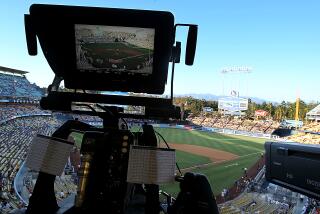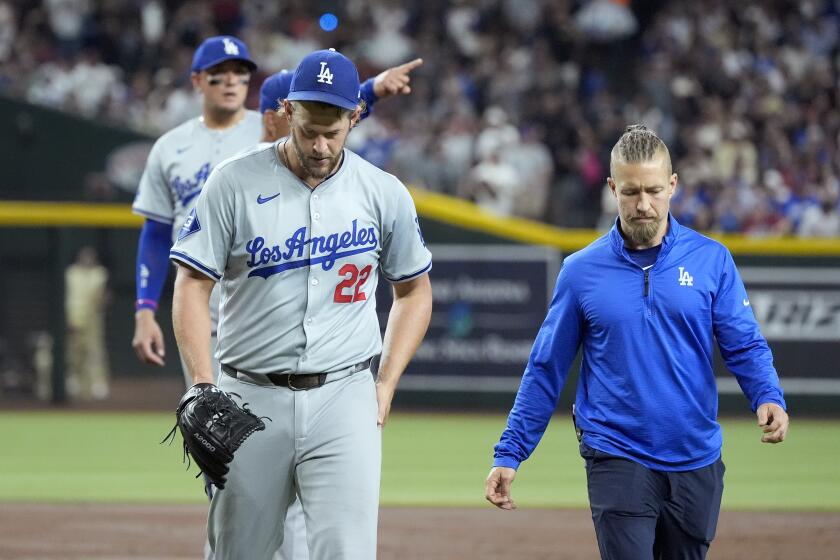Dodgers owners could gain much from Bankruptcy Court settlement
The Dodgers’ new owners could reap hundreds of millions of dollars in benefits from the confidential terms of a U.S. Bankruptcy Court settlement between former owner Frank McCourt and Major League Baseball.
The terms can be enforced for up to 40 years, with final authority over distribution of the Dodgers’ television revenue granted to the court rather than to MLB, according to two people familiar with the sale process but not authorized to discuss it. As a result, the Dodgers’ new owners could retain millions each year that otherwise would be shared with other teams.
The terms help explain the record sale price for the Dodgers and the context of MLB attorney Thomas Lauria’s statement in court last month that the settlement could result in a league of “the Dodgers and the other 29 teams.”
The disclosure of the terms could aggravate tensions among owners already upset that Commissioner Bud Selig let McCourt control the sale process to get him to surrender the Dodgers.
The commissioner’s office disputes that the terms could enable the Dodgers to tap financial streams unavailable to other teams, according to a person briefed on the league’s position.
Dodgers President Stan Kasten and MLB spokesman Pat Courtney each declined to comment, noting that the terms are under court seal.
McCourt took the Dodgers into bankruptcy last year, after Selig rejected a proposed television contract with Fox Sports. That contract called for the Dodgers to receive a minority ownership stake in Prime Ticket and annual rights fees starting at $84 million, with an annual increase of 4%.
The league takes 34% of each team’s television revenue and distributes it to other teams via revenue sharing. The league can assess an additional charge if it determines a team-owned television outlet is paying an annual rights fee under fair market value.
Under the confidential terms of the settlement with McCourt, the league agreed that the annual rights fees in the proposed Fox contract represented fair market value, according to three people familiar with the sale agreement.
Guggenheim Baseball, the Dodgers’ new owners, can negotiate a new television contract as soon as this fall, with Fox Sports, Time Warner Cable and perhaps CBS expected to bid. If the Dodgers accept an annual rights fee, they would simply pay 34% of whatever money they receive into the revenue-sharing pool.
However, the Dodgers are expected to pursue a regional sports network, on their own or in partnership with Fox, TWC or another television outlet. Guggenheim could establish a media company separate from the Dodgers, then have the company pay the team in accordance with the proposed Fox contract and keep the remaining revenue.
The difference could be tens of millions each year, according to media analysts. With broadcast outlets fighting fiercely over rights to live sporting events, the annual value of the Dodgers’ next television contract is expected to start well above $84 million.
“There will be a significantly bigger number,” said former NBA TV president Ed Desser, who testified on behalf of MLB and Fox in the Dodgers’ bankruptcy proceedings. “If the Guggenheim people didn’t believe that, they would not have bid what they bid for the team.”
Guggenheim’s winning bid of $2.15 billion was believed to be more than $500 million above the next-highest offer.
The confidential terms — and the ability of the court to enforce them regardless of what Selig might say — represented what Guggenheim attorney Michael Small called in court a “substantial component of the value proposition of the transaction.”
The league believes the deal simply provides the Dodgers with “most favorable” status, similar to the New York Yankees, Boston Red Sox and other teams that own their television outlet, according to the person briefed on the league’s position.
Andrew Zimbalist, a Smith College economist and advisor to the commissioner’s office on revenue sharing, said he could not discuss the specifics of the Dodgers’ settlement but disputed that the league had made a poor deal. He noted that ownership of a regional sports network might not be so lucrative over the long term, as fans transition from watching games on television to watching on the Internet, where the league holds the rights.
However, the more millions that flow to the regional sports network as opposed to revenue sharing, the more the Dodgers could make by selling a share of the network, said a sports industry banker who declined to be identified. Such networks generally command a sale price of at least 12 times revenue, the banker said.
The Dodgers also could try to air English and Spanish broadcasts on separate channels while paying one rights fee rather than two, according to two people familiar with the sale process. The commissioner’s office probably would take exception, but the league would have to appeal to a court that last month sided with the Dodgers on interpretation of the settlement.
Marc Ganis, president of Chicago-based Sportscorp Ltd., said the settlement could compel owners to challenge Selig.
“It’s bad enough that there is a third party,” Ganis said. “You have one set of rules — and a judge — for one team, and you have another set of rules for 29 other teams.
“They’ll say, ‘How can Bud Selig treat us differently? Do we have to file for bankruptcy and threaten to put Bud Selig on the witness stand? Is that we have to do to get treated like the Dodgers?’”
twitter.com/BillShaikin
More to Read
Go beyond the scoreboard
Get the latest on L.A.'s teams in the daily Sports Report newsletter.
You may occasionally receive promotional content from the Los Angeles Times.











